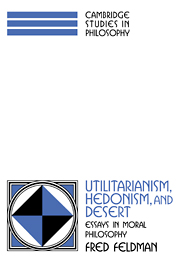Book contents
- Frontmatter
- Contents
- Acknowledgments
- Sources
- Introduction
- Part I Utilitarianism
- Part II Hedonism
- Part III Desert
- 8 Adjusting utility for justice: A consequentialist reply to the objection from justice
- 9 Desert: Reconsideration of some received wisdom
- 10 Justice, desert, and the Repugnant Conclusion
- Index of subjects
- Index of persons
- Index of cases
9 - Desert: Reconsideration of some received wisdom
Published online by Cambridge University Press: 05 June 2012
- Frontmatter
- Contents
- Acknowledgments
- Sources
- Introduction
- Part I Utilitarianism
- Part II Hedonism
- Part III Desert
- 8 Adjusting utility for justice: A consequentialist reply to the objection from justice
- 9 Desert: Reconsideration of some received wisdom
- 10 Justice, desert, and the Repugnant Conclusion
- Index of subjects
- Index of persons
- Index of cases
Summary
INTRODUCTORY COMMENTS
In “Adjusting Utility for Justice” I proposed an axiology according to which the intrinsic value of each pleasure and each pain is adjusted by consideration of the extent to which the recipient deserves that pleasure or pain. My idea was that by thus adjusting the values of pleasures and pains for desert, I could make the axiology sensitive to justice. If this succeeds, we can maintain that our moral obligation is always to make the world as good as we can make it. We will not be open to objections based on the notion that utilitarianism ignores considerations of justice. For on the proposed view, considerations of justice play a central role in determining which world is best.
But it often happens that the suggested solution to one problem serves only to introduce further problems. In this case, the further problem concerns the nature of desert. Under what circumstances does a person deserve some pleasure or some pain? What factors might affect a person's desert of some good or evil?
Essay 9 does not contain anything like a thoroughgoing analysis of the concept of desert. My aims here are modest. I merely try to show that two deeply entrenched assumptions about desert are false.
The first assumption concerns the way in which desert interacts with responsibility. It has been assumed that desert is always based on actions for which the deserving party is responsible.
- Type
- Chapter
- Information
- Utilitarianism, Hedonism, and DesertEssays in Moral Philosophy, pp. 175 - 192Publisher: Cambridge University PressPrint publication year: 1997

